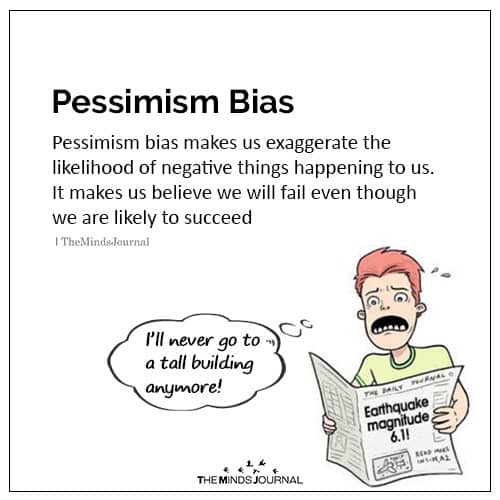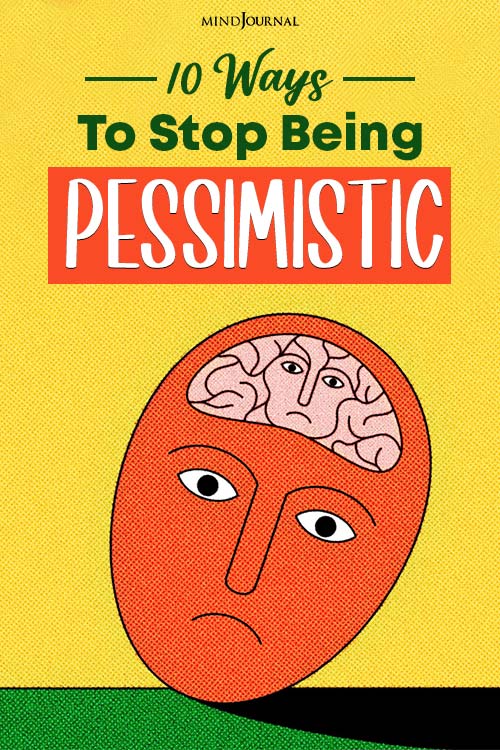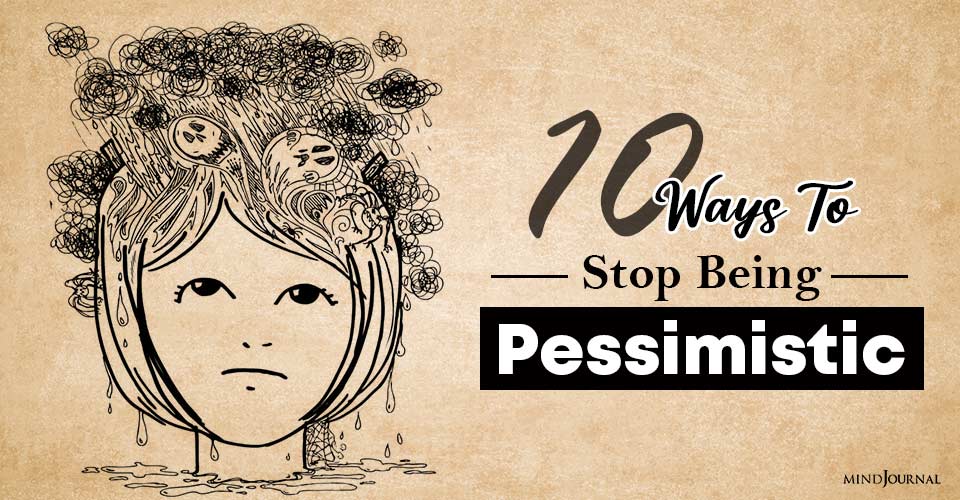Being pessimistic will only make you feel negative and scared all the time, and it will also stop you from trying out new things in life. Being optimistic on the other hand will always help you move forward in life, and truly enjoy it.
Remember being carefree and optimistic during your childhood? Now, you are older and wiser and maybe even cynical. As we get older, life gets tough because we get more responsibilities or life throws experiences at us that shape us into pessimists.
Don’t worry, even if you are at the glass-half-empty end of the spectrum, there is still hope for you. It is never too late to change your thoughts. After all, your thoughts shape your reality.
But how can you stop being pessimistic? How to be more of a “glass-half-full” person? If you want a positive reality, then your thoughts need to reflect the same. Not everyone is a pessimist, sometimes we just have bad days.
Here are a few telltale signs that will let you know if you are being pessimistic or not.
- You always think, “what if it doesn’t work out rather than what if it does?”
- You don’t get shocked when things go wrong.
- You easily give up.
- You expect to get bad news.
- Sometimes, you may be selfish.
- You find it difficult to forgive.
- You get annoyed by optimists.
- You engage in negative self-talk.
If all or some of these signs resonate strongly with you, then it may be that you are a pessimist. Don’t worry, you can still change this.
Below are ten ways you can stop being pessimistic. Do remember that these are not one-time solutions. These are small habits you need to inculcate in your everyday life.
Once you start incorporating them, they will become inherent, and being more positive will become like breathing.
Related: 4 Ways To Constructively Challenge Your Thinking
Here Are 10 Ways To Stop Being Pessimistic
1. Replace every negative thought with a positive one.
The next time you catch yourself thinking negatively or even just thinking some mind-boggling thoughts, stop there and replace that with a positive thought. It can be anything. Think of anything that makes you happy and adds value to your life.
This is essential because we have the power to rewire our brains even if many of us don’t realize it. When you constantly replace pessimism with optimism, you will rewire your brain to think more positively.
The result of this? Thinking positively will be second nature to you!
2. Make a gratitude list.
When you focus on things you have rather than what you lack, you create abundance in your life. Sometimes, we take the little things in life for granted and this is where pessimism comes from.
We don’t appreciate everything enough and this creates a negative attitude. Being optimistic is all about changing the lens through which you view the world.
Focus on what you have by making a gratitude list. Every day, write about five things you are thankful for in life. This will help you to keep things positive as you will focus on what you do have, and it’ll help stop you from being pessimistic.
3. Stop seeing setbacks as failures.
We tend to amplify setbacks in life by thinking that they are the end of the world. Everyone faces obstacles. They are part of the package deal that we call life. However, it is important to keep your perception clear.
See your setbacks for what they are. Life is a learning process and they are there to help you grow. Learn from them and do better next time.
When you feel like giving up altogether think about how you can learn from it? What is the bright side of it? How can you do things differently to get the outcome you need?
These are the questions you need to ask yourself so you can deal with setbacks in a much better way.
4. Do good things for others.
Your pessimistic mindset can only be replaced with positive thoughts. Do you know what will help you feel positive and stop being pessimistic? Being kind and doing good for other people.
If you think the world needs repair, then be the change to help repair it. Smile at someone to make their day, leave a good tip for your waiter, offer to hold groceries for an elderly, or compliment a stranger.
These little things count. They help others and they help you because your soul feels joy when you do good for others.
5. Find an outlet to release negativity.
You automatically channel your thoughts into actions. This is why if you have negative thoughts, you can channel them into doing something that releases that negative energy.
You can take up painting, drawing, kickboxing, or anything that brings you joy and helps release pent-up energy. The outlet you find is up to you!

6. Speak to yourself the way you would speak to your loved ones.
We can be our worst enemies and hinder our progress. Don’t ever speak about yourself negatively. Provide yourself the same compassion you give to someone else because you are worthy of it, too.
One great way to start speaking to yourself positively is by having positive affirmations around you. Find some things that resonate with you and keep them around the house as a reminder. This way, you will be able to easily feel more positive.
Related: 15 Signs and Symptoms Of Negative Energy In Your Body
7. Don’t label yourself as a pessimist.
If you want to stop being pessimistic, then don’t label yourself as one. Don’t ever put yourself in a box.
When we label ourselves, we are putting a limitation on ourselves. The label then defines us and we do everything according to that definition. If you label yourself as a pessimist, then you will keep thinking and doing things in a way a pessimist would.
Remove this label and look beyond it. You are just a human who has both good days and bad days. All of us do. What you make of those days is completely up to you because you have the power even if you have forgotten it.
Get rid of the label and stop putting yourself in a box. You can be anything you want, even an optimist!
8. Have people around you that provide you with positive energy.
Like attracts like. If you think of yourself as a pessimist and you have people around you that also think alike, then it is time to get rid of them. Yes, that may be hard, but it is something you need to do.
If you want to move forward in life, then you need to get rid of people and habits that don’t serve you. If the people around you add to the negativity, then find new people that are more positive.
The company you keep influences you, and when you surround yourself with positive people and optimists, then you will also start thinking that way. Let go of all the negative energy that doesn’t serve you and see how beautiful your life becomes.
9. Find someone you can vent to.
Sometimes, all we need is someone to listen to us and understand. It is important to have a person in your life that provides you with a source to share your thoughts. We can stop being pessimistic if we can find someone we can vent to.
You can vent, share your negative thoughts, and let it all out. This can be anyone. You can either vent to a close friend whom you trust or find a therapist.
The important thing is to have someone to listen to you. This will help you in taking off a burden. You will feel light and you will get a fresh perspective on things. This will give you the drive to do better and take charge of your life.
10. Include movement in your life.
The movement also gets rid of the energy that we have built up for a long. A great way to get rid of negative energy is to work out. It can be as short as a fifteen-minute workout. You just need to move your body to release that energy.
Your tensions, negativity, pessimism, and stress will be released. Your mind will become more focused and driven. You will take your mind off of all the negative thoughts that don’t serve you.
Even if you don’t feel like working out, try going for a walk or run. Being out in the open in the fresh air can do wonders for your attitude. It will also help you feel more positive.
Our bodies store our emotions, so shed those negative emotions through the wonders of movement. It doesn’t matter what kind it is. All you need to do is move!
Related: The Ruminating Mind: 4 Steps To Help Deal With Negative Thoughts
Final Thoughts
We all have an individual lens through which we look at the world. Sometimes, that lens can be distorted and no longer serve us. It is important to recognize these patterns and be serious about making a change in your life when you come to this realization.
These ten ways will help you move forward in life. They will help you break all negative patterns so you can stop being pessimistic and finally live a life full of positivity. Stop hindering your growth and progress.
Start making these changes now, and see how your life changes for the better. The first step is always the hardest, but it is one you need to take.
‘Doron Hafner is a personal and business coach, writing mostly for Vision, Belief, Change that inspires people to live the life they want, through opening their minds to new perspectives and possibilities.‘
Written By Doron Hafner Originally Appeared In Lifehack
Pessimism will never serve you well, and even though sometimes being pessimistic seems like the more realistic and easier option, you really need to put a stop to it. The more optimistic you are, the more you will be able to grow in life and fulfill all your dreams.











Leave a Reply